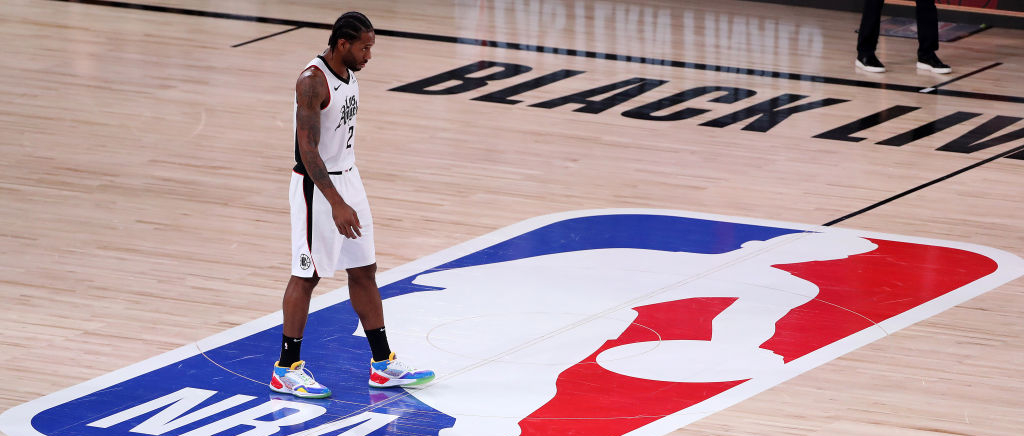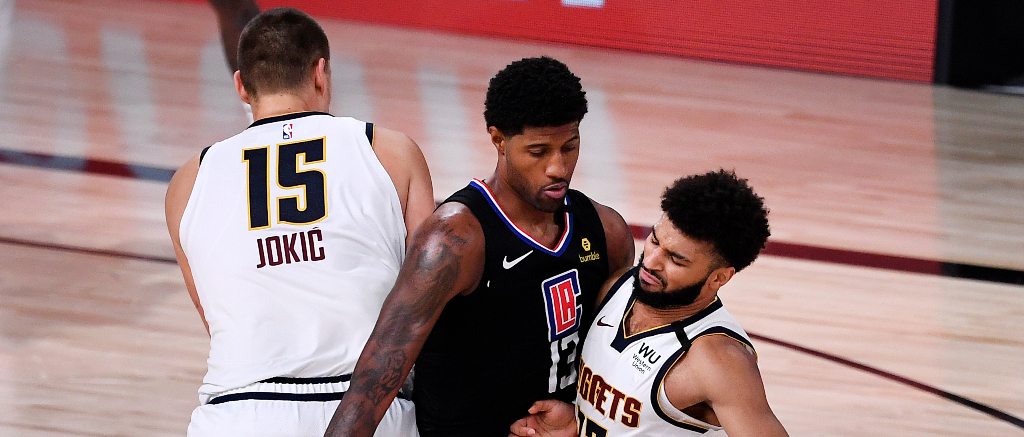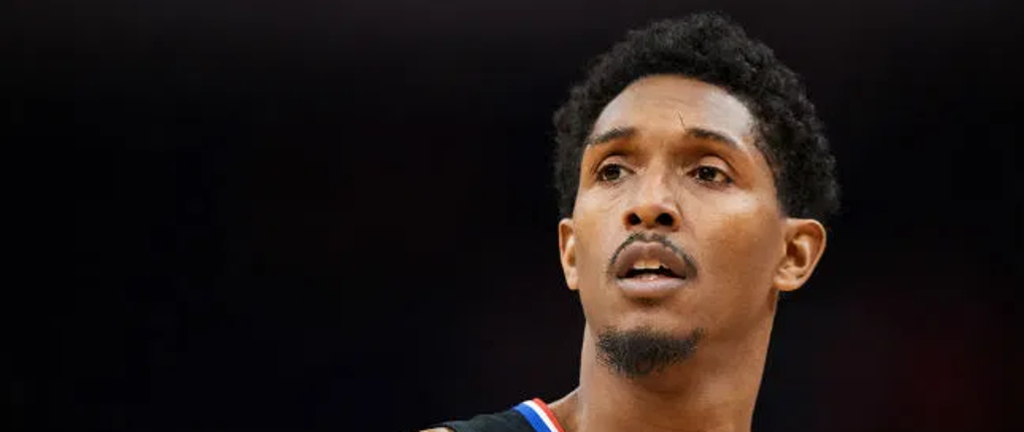
Patrick Beverley was busy. He was busy back in July 2019, when he reportedly knocked on LeBron James’s door the night Kawhi Leonard’s trade to the Clippers was announced to deliver the not extremely sure in its own words promise, “It’s pretty much over for you guys now.”
He kept busy when the season got started, taunting fans at Oracle after the Clippers beat the Warriors in late October, telling Steph Curry, “You had the last five years, the next five years are mine.”
You could say that Beverley stayed busy all season, easily picking up where he left off when the Bubble got underway. He compared Nikola Jokic to Luka Doncic only in their propensity for “a lot of flailing” and shot down Michele Roberts, the executive director of the NBPA, in a players meeting during the game stoppages as she explained the potential financial ramifications of the pause. Beverley is a career talker, deft at flinging smirking barbs at anyone and everyone, but the talk was always best paired with basketball. This season, much of the talk came despite the Clippers not quite living up to lofty expectations.
The Clippers’ own loud, vaguely prophetic preseason trajectory mirrored Beverley’s. They’d made visible passes at Leonard, sending their people to sit in the stands in Toronto as part of a prolonged courting process that ultimately had Steve Ballmer crowing in victory during Leonard and Paul George’s first press conference in L.A. The team’s marketing machine quickly got to work, attempting to position the franchise as the blue collar alternative to the Lakers even as plans were unveiled for the team’s new $1 billion dollar arena in Inglewood.
In the fall, the team cut through the latent haze of its summer fireworks and started the slow climb to the prophesied top the same way any other club would have to, one game at a time. To its credit, the front office got out of its players’ way. The Clippers looked perfectly fine. Their schedule stacked them early against their Staples Center roommates, and two former champs in the Raptors and Warriors, they beat all three by double digits. But the losses that started to pepper their season, looking back, gave some clues as to what was coming. When Kawhi Leonard sat, they played like a barely above-.500 team, going 8-7 without him.
Leonard is a masterclass in basketball all by himself. Watching him play, there is a sense that he’s never quite in the game, its physicality and sharply tactile elements slipping around the hulk of him as he works lightly above it all, looming in another plane. He’s not an absent player — when Leonard dominates, the whole floor’s in his thrall — but to reach that higher, bullying cognitive state, his head has to be clear, while the engrossing repetitions necessary in contextualizing the court — calling plays, slowing things down, constant communication — is best left to somebody else.

In Toronto, Leonard had a floor savant in Kyle Lowry, someone whose future-sight of how things could unfold, in any dozen of possible scenarios, came just as lightly and by reflex. Lowry ground all possible barriers down so Leonard could make cutting through the paint, or finding a clear corner to fade from, look like water-walk. In San Antonio, buttressed between Tim Duncan’s leadership, an overall equilibrium that kept offense and defense forever flowing into each other, the playmaking of Tony Parker, and Manu Ginóbili’s sprawling, fearless range, Leonard was protected. With no pressure to lead, he was free to pop up, fadeaway, step quietly through all the space being created for him, and afforded endless lethal routes to the rim. In L.A., there was no such sage.
Without leadership, the Clippers are a collection of good, but easily stymied, players. Denver was able to adjust. Whether they needed the three games they took to do it or added two for dramatic effect will stay a club secret, but they clamped down on defense to frustrate, chase, and do whatever was needed to mar the Clippers’ favorite looks. Without an efficient leader to reorganize and redirect, Leonard, George, Lou Williams, and Montrezl Harrell tried in vain to go through through the walls the Nuggets were putting up.
There were plenty of other ways the Clippers lacking leadership cost them. The post-Game 7 blame shifts, while vague, named absent chemistry, fatigue, and a lack of understanding when it came down to, in Leonard’s words, the “exact spots we need to be,” but all these ephemeral excuses cut to a harder point: they had so much time to figure it out.
Per Cleaning the Glass, the starting five the club relied on in the postseason of Marcus Morris, Ivica Zubac, Beverley, George, Leonard played 298 possessions together in the regular season. The trio of Leonard, George and Williams together played 452. The team, as a whole, played 6,903. The Lakers, comparatively, ran their playoff lineup through 634 possessions, and that’s still second to the team’s regular season lineup that included Avery Bradley, who opted out of the restart. The Lakers also have a roster of largely new, occasionally discordant pieces, but they also have James, someone who not only excels at putting the onus on himself to close the gap between a freshly constructed team and its championship aspirations by fostering a very specific organizational culture, but who patently demands of teammates put up or shut up.
As much as the Clippers front office worked tirelessly to separate themselves from the purple and gold presence that haunted their home on alternating nights, it may have served them to study the devil they knew. In James’ sophomore year under the marquee lights of Showtime, the Lakers brought back only five players out of last year’s mainstays and a brand new coach. Add in a late acquisition of Dion Waiters, an even later sub of J.R. Smith, and Rondo’s initial absence from most of the restart, and the Clippers look like old friends by comparison.
Another team not all that concerned with how their fresh chemistry could be tested are the Heat, who entered the ECF with a 10-2 record. Their secret, forged from Pat Riley’s unflinching system and honed by the bold, crafty coaching of Erik Spoelstra is so loud it isn’t really one at all — they talk, all the time, they never stop. And to the verbal cues they touch, toss hand signals, all of it combining into a confidence that’s cyclonic, whipping around the court without leaving air for even a breath of doubt.
What the Clippers lacked was the road testing. The team’s leadership, seasoned as it was with Rivers knowing the ropes since 2013 and a tenured front office braintrust so intent on giving the team all the tools it needed to triumph in the postseason, saw the road of the regular season as a thing to get over instead of through. It was impossible to hand Leonard a team constructed for a championship and expect him to lead it while maintaining a strict (and, to be fair, necessary) schedule of load management — you can’t drive from the bench. They wanted him perfect for the playoffs, but the team suffered because in his first year as a true, singular leader, he couldn’t see what made it tick.

Even Denver, now the surprise out of the West, was a story as subtle as a mountain will sit stubbornly, forgettably, at the horizon, not showing its full scope until you yourself draw any closer. Nikola Jokic and Gary Harris were drafted in 2014, Mike Malone hired a year later, Jamal Murray drafted in 2016, Paul Millsap snagged as a free agent in 2017, all gradual changes working toward something bigger with Denver’s largely unchanged bench as a ballast.
This season, including the March-June hiatus, has been happening for nearly 12 months. A historic near-year of bought time to address what had loomed since the Clippers first handful of games. Whether Ballmer and Rivers were initially intent on laying tracing paper over Toronto’s blueprint, or tried to protect who they saw as their best chance to win, the team never stored up enough experience together to fuel them when it came time to close.
Chemistry comes from work, whether it be a collection of personalities coalescing after going through the wringer or a group that’s been blitzed and battle-tested, who’ve learned not just from wins but adjusted quickly after losses. It’s cited as quickly in the story of the underwhelming Clippers as it is in the narrative surrounding a team has that makes it all the way, but trace chemistry back to its origins on a team where it’s humming at a discernible volume and you’ll find a secure sense of trust. When a team’s winning, trust and how it manifests — passing, communication, the versatility to adapt in tight spots — can be something rolled easily into a category of intangibles, a permeating element that touches everything a team does well, not necessarily supported by any one stat but crucial to in-game execution. When trust wanes, as etherial as it can seem, all of those “intangibles” visibly suffer — players go ISO, chatter quiets, shooting cools, and team confidence wilts.
Rivers acknowledged the absence of trust on the floor in Game 7, saying postgame, “We start missing shots and you can see us trusting less and less and less.” Williams, too, lamented on this while looking back on the season as a whole, saying that “A lot of the issues we ran into, talent bailed us out. Chemistry didn’t.”
The Nuggets, on the other hand, have it in spades. They have learned from every game in the playoffs, proving a team not considered elite defenders could improve enough on that end of the floor to clamp down on the Clippers, relentlessly rattle their shot selection, and muck up any semblance of half court offensive cohesion. They hustled, going after loose balls where the Clippers wouldn’t, kicking the ball around to tire out a team already looking gassed. Successfully under the Clippers’ skin, Denver dismantled any confidence L.A. had left, picking passes from overhead like low-hanging fruit, slicing languid lanes to the basket, pulling up from practically anywhere they wanted. A team doesn’t come back 3-1 without an unwavering, self-generative wellspring of trust. The Nuggets did it twice.
The problem with treating chemistry as eventuality, like treating talent as a tangible reserve, crystallizes on a team like the Clippers, stacked so thoroughly with personalities that chemistry essentially inverts. When the majority of a roster sees themselves as team figurehead or embodiment — their concerns and problems on and off court the most pressing — there’s no collective understanding as to what the team even is, let alone aspires to be.

“You go from last year, we were the team that wasn’t expected to make the playoffs to going and being a championship-caliber team when you bring in two high-level guys, that’s an adjustment,” Williams said. He was right, but it was an adjustment nobody on the team ever bothered to make.
As a nebulous identity, the franchise became a useful vacuum in sucking up any blame being tidily brushed aside. George said in June the team expected to “come in and win it all,” there was no plan “to take a year to get used to each other.” After elimination, George shrugged, “This was not a championship or bust year for us.” He could be revisionist because there was hardly a team narrative to follow, everything up to then had been individual lines in a cast of leads imagining their own stories.
Even Rivers, his third trip back to this exact same place, could give no definitive answer to something that had been heralded as surefire suddenly stuttering out. Prior to Game 7, Rivers told his team to “play free,” a strange and tenuous notion for a group with title expectations that faced elimination. There was no form, no follow through, like any measure of heart shown was just going to weigh them down.
“I mean, listen, obviously I could have done something more,” Rivers said regretfully after the loss, and while the overwhelming response is to ask why he did not, the burden of blame, like the absent mantle of leadership, never rested squarely on Rivers. Having gotten through this prolonged season without ever coming together, there’s still no team to really isolate or analyze, only a sense of each player, “talent” as Williams called them, slowly backing away into their respective off seasons. Rivers can’t plan for what still doesn’t exist.
In a presser hosted by NBA Canada after the Nuggets series win, Murray was asked repeatedly for the secret behind how they’d made it happen. Murray, polite, credited his teammates and the identity they’ve built together over the years. But, with a pause at another question on his success, Murray dipped his head thoughtfully and delivered the only potential dig: “There’s a thing called mental work, too.” He talked about the ability to stay focused, clearing out what isn’t important to the game being played and zero in on the work that needs to be done. It is not an eventuality, but a directive to dig in and take responsibility, to create something lasting with the team around you.
Effort is what Murray was getting at, playing like it matters. In the last game the Clippers would play all season, that effort was clear, painful only to the Clippers. Denver never “played free,” but anchored by joy and tied with trust they ascended. Next season, the Clippers could stand to be boxed in by that kind of belief.
